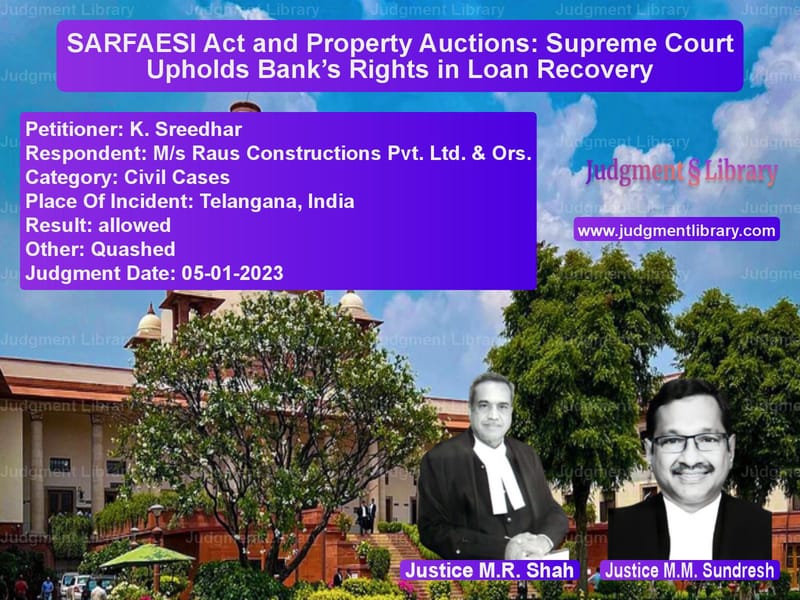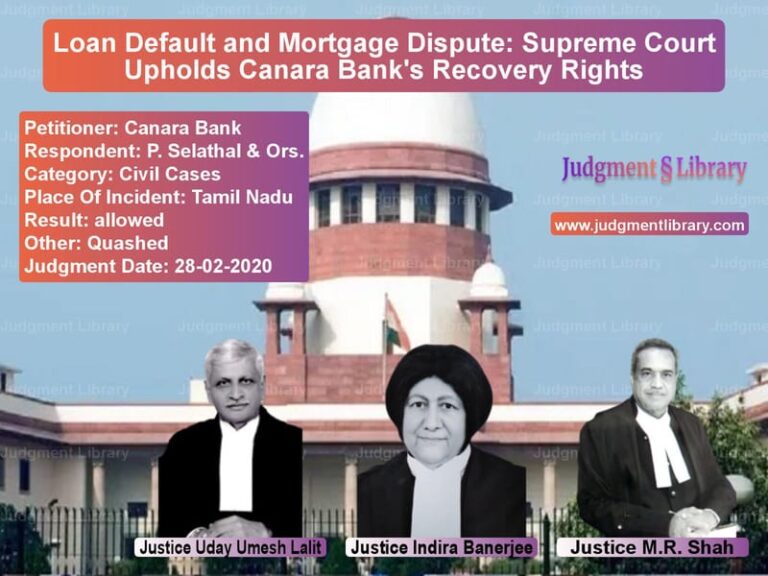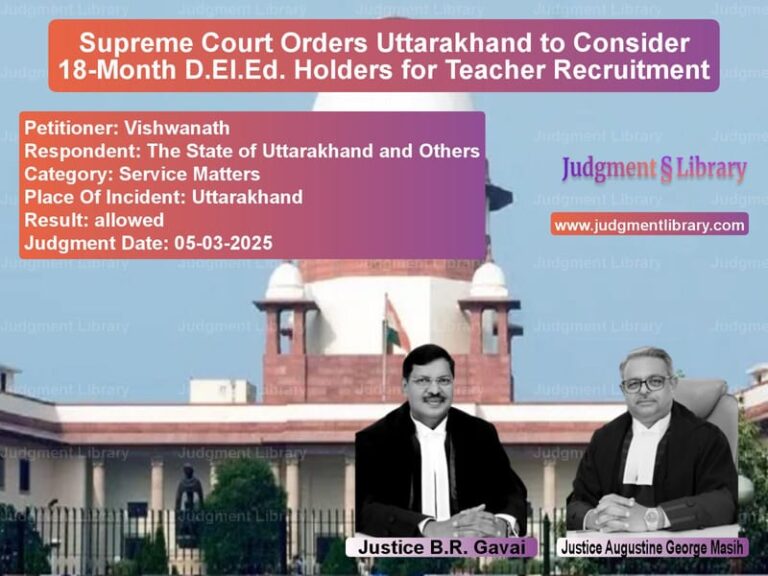SARFAESI Act and Property Auctions: Supreme Court Upholds Bank’s Rights in Loan Recovery
The case of K. Sreedhar vs. M/s Raus Constructions Pvt. Ltd. & Ors. involves critical legal questions regarding the applicability of the Securitisation and Reconstruction of Financial Assets and Enforcement of Security Interest (SARFAESI) Act, 2002 in loan recovery and auctioning of mortgaged properties. In its judgment dated January 5, 2023, the Supreme Court overturned the Telangana High Court’s ruling and upheld the rights of secured creditors under the SARFAESI Act.
Background of the Case
The dispute arose when M/s Raus Constructions Pvt. Ltd. (the debtor) availed credit facilities from Indian Bank in 2012. Due to defaults, the loan account was classified as a Non-Performing Asset (NPA), leading the bank to initiate proceedings under the SARFAESI Act.
The secured creditor issued:
- A demand notice under Section 13(2) of the SARFAESI Act.
- A possession notice for properties mortgaged as security.
- A sale notice for e-auction of the properties.
One of the properties, Item No.8, was auctioned and purchased by the appellant, K. Sreedhar. After paying the full sale consideration, he was issued a sale certificate and took possession.
Legal Issues Examined
- Did the auction violate Rules 8 and 9 of the Security Interest (Enforcement) Rules, 2002?
- Was the mortgaged property an “agricultural land” exempted under Section 31(i) of the SARFAESI Act?
- Could the High Court intervene under Article 226 when an alternative remedy was available under the Debts Recovery Tribunal (DRT)?
Arguments of the Appellant (Auction Purchaser)
The appellant, K. Sreedhar, contended that:
- The auction was conducted in compliance with the SARFAESI Act and the Security Interest Rules.
- The debtor had an alternative remedy of appealing to the Debt Recovery Appellate Tribunal (DRAT) instead of approaching the High Court.
- The full sale consideration was paid within the stipulated time.
- The High Court wrongly presumed that the land was agricultural without proper evidence.
Arguments of the Respondent (M/s Raus Constructions Pvt. Ltd.)
The debtor argued that:
- The bank’s auction process violated Rules 8 and 9 of the Security Interest Rules.
- The property in question was agricultural land and should have been exempt under Section 31(i) of the SARFAESI Act.
- The auction purchaser did not pay the full sale price within the required time frame.
Supreme Court’s Observations
The Supreme Court, comprising Justice M.R. Shah and Justice M.M. Sundresh, ruled that:
“The High Court has materially erred in holding that the sale was in violation of Rules 8(1) & (2) and 9(4) of the Security Interest (Enforcement) Rules, 2002. The sale was conducted in accordance with the prescribed procedure, and the auction purchaser made the full payment within the required timeframe.”
Key Legal Findings
- No Violation of Security Interest Rules: The Court found that the auction complied with Rule 9(3) and Rule 9(4) as the full payment was made within the stipulated period.
- Alternative Remedy Available: The debtor had a statutory remedy under the DRAT but bypassed it by approaching the High Court.
- Agricultural Land Exemption Does Not Apply: The Court ruled that merely being recorded as agricultural land in revenue records was insufficient to claim exemption under Section 31(i) of the SARFAESI Act.
- Possession Notice and Sale Certificate Valid: The Court upheld the sale in favor of the auction purchaser, stating that it was legally executed.
Final Judgment
The Supreme Court ruled that:
- The Telangana High Court’s decision was quashed.
- The sale of the property to the auction purchaser was valid.
- The debtor’s challenge to the sale was dismissed.
Implications of the Judgment
This ruling has significant implications:
- Clarifies Property Auction Rules: Reinforces that auction sales under the SARFAESI Act must comply with procedural requirements.
- Strengthens Bank’s Rights: Affirms that banks can recover debts through auctions without undue judicial interference.
- Prevents Misuse of Agricultural Land Exemption: Ensures that debtors cannot misuse the agricultural land exemption under Section 31(i) without substantial proof.
- Limits Judicial Overreach: Reiterates that High Courts should not entertain writ petitions when alternative statutory remedies exist.
Conclusion
The Supreme Court’s decision in K. Sreedhar vs. M/s Raus Constructions Pvt. Ltd. & Ors. upholds the principles of loan recovery and debt enforcement under the SARFAESI Act. By setting aside the High Court’s ruling, the judgment strengthens the rights of banks and financial institutions while ensuring that legal procedures for auctions and property sales are followed correctly.
Petitioner Name: K. Sreedhar.Respondent Name: M/s Raus Constructions Pvt. Ltd. & Ors..Judgment By: Justice M.R. Shah, Justice M.M. Sundresh.Place Of Incident: Telangana, India.Judgment Date: 05-01-2023.
Don’t miss out on the full details! Download the complete judgment in PDF format below and gain valuable insights instantly!
Download Judgment: k.-sreedhar-vs-ms-raus-constructio-supreme-court-of-india-judgment-dated-05-01-2023.pdf
Directly Download Judgment: Directly download this Judgment
See all petitions in Property Disputes
See all petitions in Contract Disputes
See all petitions in Debt Recovery
See all petitions in Judgment by Mukeshkumar Rasikbhai Shah
See all petitions in Judgment by M.M. Sundresh
See all petitions in allowed
See all petitions in Quashed
See all petitions in supreme court of India judgments January 2023
See all petitions in 2023 judgments
See all posts in Civil Cases Category
See all allowed petitions in Civil Cases Category
See all Dismissed petitions in Civil Cases Category
See all partially allowed petitions in Civil Cases Category







